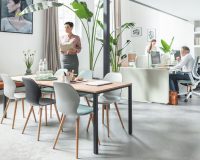In a world where the boundaries between home and office are becoming increasingly blurred, people’s wellbeing needs to be placed at the heart of business strategies.
In recent years, many companies (driven by current changes and in-depth research) have come to understand that people’s wellbeing is not only a legal obligation and important from an ethical point of view, but also crucial to the success of the company from a strategic point of view. The pandemic focused even more attention on people and their wellbeing. It made companies realise that organising work differently (remotely) is possible and productive.
This following excerpt comes from an article in Sedus INSIGHTS N° 13 “Home Sweet Home”
Productive – at home and in the office
Although many organisations have understood the principle of teleworking, many problems have arisen. Research suggests that a mixed model of working (in the office and remotely) will be adopted after the pandemic. We will move towards a “diffuse” office model where the office and the home will be the two main physical locations that make up the ecosystem. In this dimension, where both the role of the office and the home are evolving, companies will need to organise themselves even more for their own benefit and that of their employees.
Here are some tips:
- Crossover furniture
- The office as a social and collaborative platform
- Technologies for organising
Crossover furniture
In the new diffuse model, the boundaries between home and office will become even more blurred than before. It will be necessary to make offices as cosy as homes and homes as efficient as offices. Companies will use furniture in the office that is suitable for work, but also comfortable and inviting. For home, it is important to advise employees that the furniture they work on is suitable for the home environment. For furniture to be suitable for different working environments, the use of colours, materials and finishes can make all the difference in style that is needed. After all, a comfortable workplace is fundamental to making us feel good and positive about working.
The office as a social and collaborative platform
Maintaining and even strengthening the social network of the corporate community is as important for human well-being as it is for productivity. In remote work, research shows how people suffer from a lack of ‘real’ social relationships with colleagues and how this negatively affects motivation and a sense of belonging. In the diffuse office model, it is important that companies implement policies that promote people’s well-being through relationships and social cohesion. In this new dimension where people can work where they want, companies need to redesign and focus on offices as a space for conviviality, relationships and collaboration between people.
Technology to organise
Time and space management in the shared office is a need for employees and a challenge for companies. With office work becoming more flexible, there will be fewer and fewer assigned workplaces and more and more employees will want to organise their day differently. In order for employees to manage their time and deal with such a dynamic situation, companies need to equip themselves with software and digital platforms. With these tools, employees can plan their time and space by, for example, reserving workstations in the office and better manage their relationships with colleagues by knowing where the person they are looking for is working and if they are available. In this way, companies can combine the well-being of employees with the demands of running the business.







